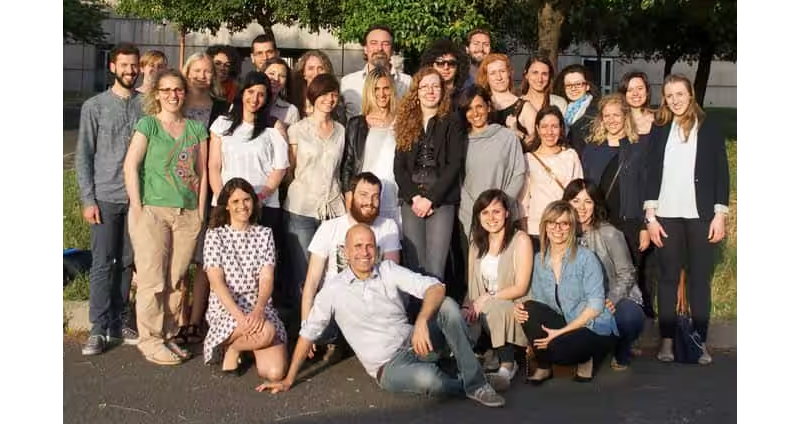Dr. Francesco Cecconi
"Cultivate your unique vision. This is what people like most in scientists."
I’m Francesco Cecconi, and this is why I research.
Dr. Francesco Cecconi is Director of the Cell Stress and Survival Unit at the Danish Cancer Society Research Center. He received his doctoral degree from the University of Tor Vergata in Rome. There, he studied in the laboratory of Francesco Amaldi, in one of the most renowned research Units in Europe in Molecular Biology. In 1996, after obtaining his PhD in Molecular and Cellular Biology, Dr. Cecconi studied mammalian programed cell death at the Max Planck Institute (Germany) as a post-doctoral researcher in the laboratory of Dr. Peter Gruss. In his post-doctoral studies, Dr. Cecconi identified the apoptosis protease activating factor, Apaf1, a gene crucial for neural development and apoptosis. In 2000, Dr. Cecconi started his own laboratory at the University of Tor Vergata. As a laboratory head, Dr. Cecconi was the first to identify and characterize the activating molecule in Beclin 1-regulated autophagy, Ambra1, a downstream target of mTOR responsible for autophagosome formation. In April 2013, Dr. Cecconi was appointed the Director of the Cell Stress and Survival Unit at the Danish Cancer Society Research Center. His lab is now committed to unravelling the upstream regulation of autophagy and elucidating the role of this process in cancer. Dr. Cecconi is an Elected Member of the European Molecular Biology Organization (EMBO), The Deputy Director of the Center of Excellence for Autophagy Recycling and Disease (CARD) at the Danish National Research Foundation, and the current Director of Cell Stress and Survival Unit at the Danish Cancer Society Research Center.
Would you tell us what sparked your interest in basic science?
This was a late "enlightenment". I was studying General Biology in the first year of medical school when I experienced the mystery of molecular biology. It was then that I met my first mentor, Francesco Amaldi, the heir of an Italian family of great and famous scientists, who inspired me with the pleasure of scientific discovery.
Your research has helped characterized the signaling and molecular mechanisms regulating autophagy and apoptosis. To you, what important questions in the field of autophagy and apoptosis are left unanswered?
In both fields, first apoptosis and then autophagy, what I feel is of the highest importance is discerning how individual multi-molecular complexes, single genes, or even post-translational modification sites that are part of a still obscure code coordinate autophagic and apoptotic events in conjunction with other cellular pathways. A fine molecular tuning may be the essence, not just a detail, of a given cellular response.
You have made important discoveries in Autophagy. Is there one particular experiment or discovery you feel most proud of? An ‘aha moment’?
Oh yes! The first observation of the apoptosis Apaf1-deficient phenotype in mouse embryos, on a cold winter-weekend in snowy Göttingen (Northern Germany). My wife still has a vivid memory of that moment. The samples where on a multi-well dish on our bovindo (bay window), looking over a shiny white grass field. And the phenotype was as evident as my contagious enthusiasm!
Tell us more about the questions your lab is currently investigating and where you see your research moving in the future?
We actively study the role autophagy plays in cancer, how autophagy interacts with cell death pathways, specifically mitochondria-cell-death, and how manipulating individual post-translational modifications may impact a cancer cell response. My research is moving towards a putative and ideal anti-cancer therapy, in which individual single events, and not global autophagy, are modified.

Describe why your research is important to the ordinary citizen.
Max Planck’s most famous aphorism speaks: "Knowledge precedes application". I spent my postdoctoral training at the Max Planck Institute with my second mentor Peter Gruss, and I fully believe in that aphorism. What we find in the physiology of a cell, often when the cell is under stress, can then be used for the benefit of large cohorts of human patients and in a wide range of diseases. If you know what a cell is suffering for, you can exploit it, either to kill that cell or to promote its survival.
Outside of autophagy, what research do you find especially exciting right now?
Research from two fields: Optogenetics and Immune Therapy - the first to activate cellular biochemistry with normal blue light; the second to exploit our own physiological capacities to treat cancer. The first being highly futuristic and innovative; the second, a modern view of an old common perception. Two ways of being visionary.
Do you have any advice for someone interested in a tenure track position?
Just follow your passion and forget about "safe" fields, with commonly shared aims and intense funding at present. Or, anyway, cultivate your unique vision. This is what people like most in scientists.
And finally, if you could have one superpower, what superpower would that be?
Ah-ah, definitely IMMORTALITY! How could a scientist working in the cell death and survival field... think something different?
Select Publication by Dr. Cecconi:
- Cecconi, Francesco, et al. "Apaf1 (CED-4 homolog) regulates programmed cell death in mammalian development." Cell 94.6 (1998): 727-737.
- Fimia, Gian Maria, et al. "Ambra1 regulates autophagy and development of the nervous system." Nature 447.7148 (2007): 1121-1125.
- D'Amelio, Marcello, et al. "Caspase-3 triggers early synaptic dysfunction in a mouse model of Alzheimer's disease." Nature neuroscience 14.1 (2011): 69-76.
- Nazio, Francesca, et al. "mTOR inhibits autophagy by controlling ULK1 ubiquitylation, self-association and function through AMBRA1 and TRAF6." Nature cell biology 15.4 (2013): 406-416.
- Cianfanelli, Valentina, et al. "AMBRA1 links autophagy to cell proliferation and tumorigenesis by promoting c-Myc dephosphorylation and degradation." Nature cell biology 17.1 (2015): 20-30.
- Strappazzon, Flavie, et al. "AMBRA1 is able to induce mitophagy via LC3 binding, regardless of PARKIN and p62/SQSTM1." Cell Death & Differentiation 22.3 (2015): 419-432.